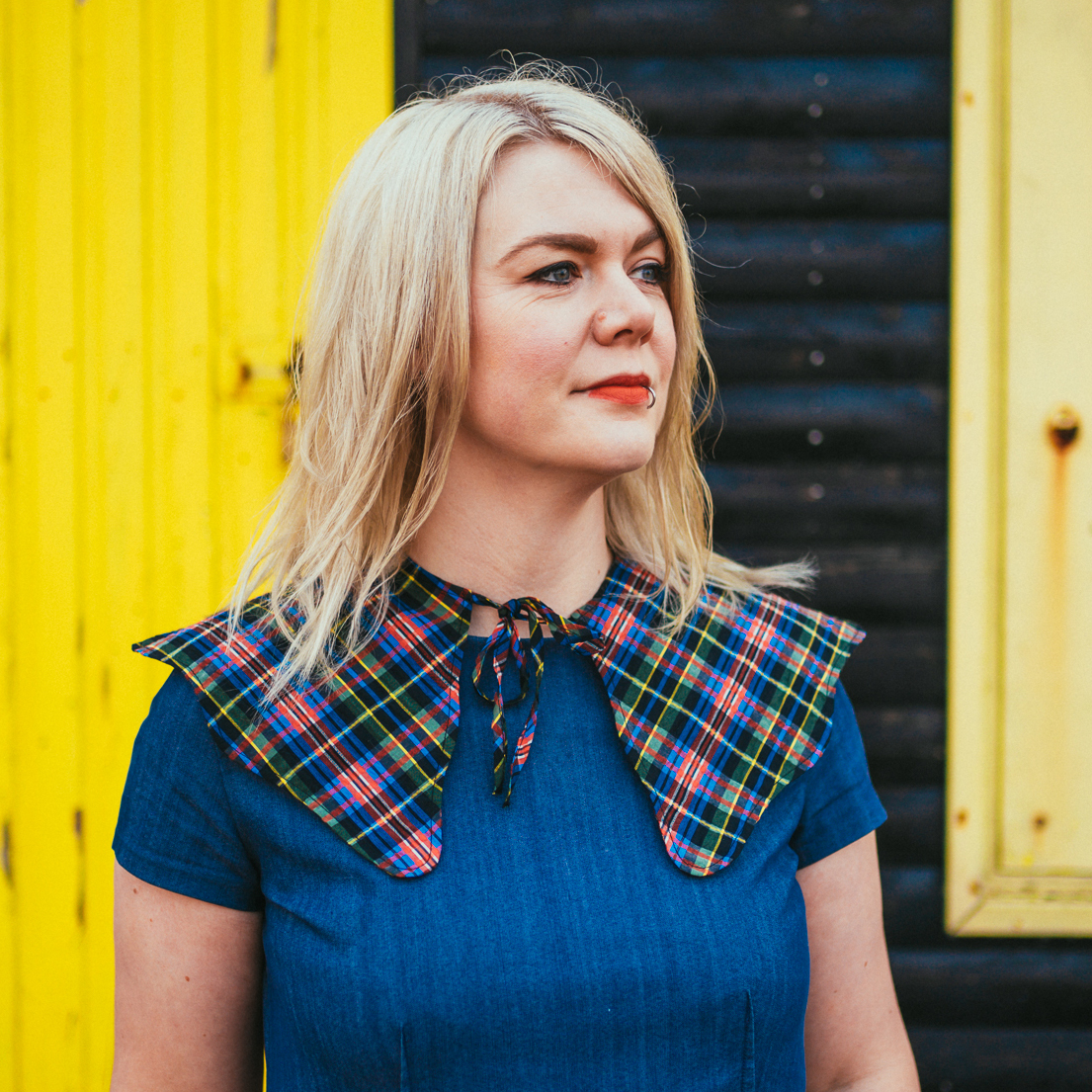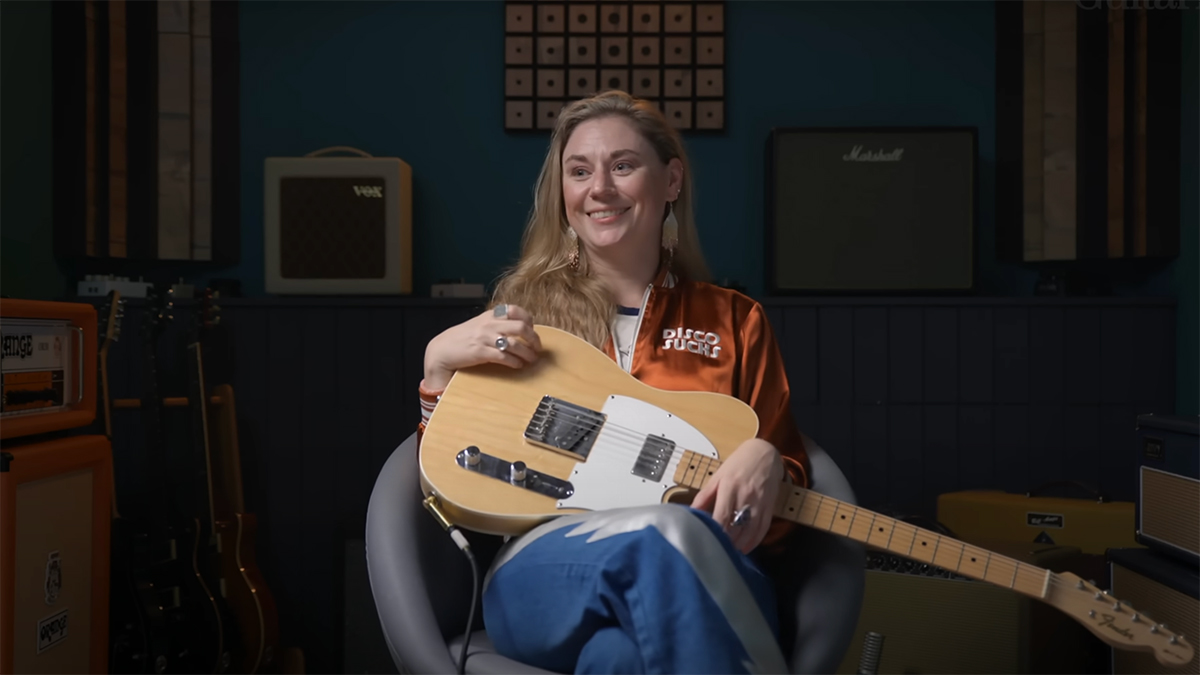Slothrust’s Leah Wellbaum: “There's a culture where women haven't been as encouraged to be loud and take up space. Guitar solos are the opposite of that”
As the alt-rockers release new record Parallel Timeline, Wellbaum talks collaborating with Lzzy Hale, her multiple pedalboards and why deconstructing gender is crucial to encouraging more diverse lead guitarists

When Leah Wellbaum, guitarist of Boston alt-rockers Slothrust joins our call, she’s busy getting to grips with the new Fender American Acoustasonic Jazzmaster with a few enlightening realizations.
“It has an active pickup,” she beams, with the guitar held aloft, “which means to use it through a pedalboard, the pickup has to be charged. So right now it's plugged into my wall with my phone charger!”
The musician isn’t averse to technical wizardry, though, boasting both an analog pedalboard with a mean line in Keeley effects and a Line 6 Helix amp modeler, after being tipped off by producer Billy Bush.
Bush is behind the last two Slothrust releases, 2018’s The Pact and their latest, Parallel Timeline. The multi-Grammy nominated producer is best known for his work with alt-giants Garbage (Bush also techs for the band and is married to frontwoman Shirley Manson) and has been crucial to Slothrust’s evolution in sound, according to Wellbaum.
“He was like ‘Listen, this pedalboard is great for being on the road and being able to really sculpt your tones and have something that can go directly to the PA because also it has amp modeller.’”
So, with the new record freshly out in the wild, we continued our interrogation with Wellbaum to hear about her essential pieces of gear, how music theory is magic, and why deconstructing gender is crucial in encouraging more diverse lead guitarists.
What are your earliest memories of picking up the guitar; how old were you and what were you playing?
All the latest guitar news, interviews, lessons, reviews, deals and more, direct to your inbox!
“My first instrument was the piano. I come from a family of classical musicians and there was a lot of pressure to practice all the time and I didn't like that. I went to a performing arts summer camp and this guitar teacher tried to teach me how to play Californication by the Red Hot Chili Peppers. But I couldn't do it because it hurt my hands.
“I teach a lot of guitar now and have for a long time, and the number one learning curve that can be difficult for beginners on the guitar is the fact that there is some pain and discomfort involved to get to the point where you're able to play fluidly.
“A lot of acoustic guitars don't have amazing action on them, so you do have to press down super-hard to get some notes, and so this man was trying to teach me Californication and I was livid because I was used to music coming to me easily.
“But you know, I was always really interested in rock and alternative music, so I got back into it around the time I was 14. Once I stopped resisting it, I loved having a portable instrument.”
You went to Sarah Lawrence College where you and Will [Gorin, Slothrust drummer] started performing in blues and jazz bands, and at one point a chamber-music improv group. How did those genres influence your music writing today?
I love music theory. It's the math and the science behind the magic because music is magic, undoubtedly
“I've always been attracted to different genres of music, for sure. Chopin is one of my favorite composers. I love the way that his piano pieces feel like paintings. [There are] these massive sweeping arpeggios. I'm not someone who's shied away from music theory either.
“I love music theory. It's the math and the science behind the magic because music is magic, undoubtedly. It's one of those things that accesses parts of your nervous system that are impossible to access otherwise.
“It's why we get goosebumps when we listen to music, and we find ourselves moved by it and can't even articulate why. So understanding the science and the math behind it has been attractive to me. Because I think that with those tools, you can open up this other layer of magic.”
What are some of your essential pieces of gear that you use to produce and create music with Slothrust?
“For stage, I play a Fender Twin. [It] has been my go-to amp for a long time. At home right now, I have the Deluxe Reverb Tone Master amp, which is not a tube amp. It's a solid-state amp that Fender made to be a super-light version of the Twin Reverb. I love it because I can lift it with one hand. That being said, it doesn't get even a fraction as loud as the Twin Reverb does.
“For recording, I will play a lot of different guitars. On both The Pact and Parallel Timeline, but particularly on Parallel Timeline, I played a guitar that my friend Rich made for me. His brand is called Venice Guitars.
“We had him over for lasagna one night and then he was like, 'Oh, I have a surprise for you.' And I thought he was gonna show me a cool photo or something, and he pulled out this guitar. It's a Jazzmaster body style guitar so definitely, for me, the Jazzmaster body type is the one I've been playing for a long time now.
“The guitar he made me gets really smooth bends on it, and I love bending. That's one of my favorite things to do on the guitar and that's part of why I wanted to learn how to play lead guitar, because when you bend a note on the guitar, what you're doing is you're imitating the human voice. You can make the guitar sing in a way that is super-unique to that instrument. You can't do that on the piano.”
You spoke in another interview about your shift performing as a rhythm guitarist to lead guitarist especially after seeing “a lot of the boys [being] incredibly confident at playing lead” even though “a lot of them weren’t very good”. What do you think the barriers are for young women and non-binary artists taking on those lead roles?
“People who are perceived to be female are often socialized to feel like they should be quiet and like they should be afraid of being particularly loud. Being loud is disruptive. It's calling too much attention to yourself. It's arrogant. It's all these things that are often considered positive qualities in young boys. 'Oh, he takes so many risks. He's so outgoing,’ you know?
“Because of that, there's a culture where women haven't been as encouraged to be loud and to take up space, and when someone is made to feel as though they shouldn't be taking up space, they make themselves smaller.
I've stayed completely open the entire time and not been attached to how anything had to be. I tried to let each of the songs on this record reveal themselves to me
“Guitar solos are the opposite of that. That's someone stepping out and taking a risk. Because of that, we end up with an issue of visibility because fewer people are inclined to be doing it loudly and proudly.
“I'm happy to say that I think there's this massive shift happening with that, for sure, as we deconstruct gender and recognize how little it means in certain contexts and how fluid it is.”
Recent single The Next Curse dissects the current climate crisis and features Halestorm leader Lzzy Hale. How did that collaboration come about?
“I've been friends with Lzzy for a while and first heard her sing on YouTube, and was completely blown away by her voice. I'm a really big fan of musical theater and I think the highest praise I can give to a singer is just when I see them and I'm like, 'You should be on Broadway.' Honestly, it's kind of sleazy. But it's how I felt when I heard Lzzy sing. I felt like she was just such a star.
“I heard her do things vocally that I had never heard women do before. She's able to scream and sustain pitch in a register that is just really unbelievable. It reminds me a bit of Steven Tyler.”
Parallel Timeline is your fifth studio album and follows 2018’s The Pact. What would you say are the biggest differences between both records for you as a songwriter?
“Something completely distinct about Parallel Timeline is that we've never performed any of these songs live before. Any performance of these songs has been me playing them acoustically on Zoom to people, versus The Pact, there were a handful of songs on there that we tried out live.
“So the whole process of [this record] has been a little bit more mysterious. But within that, I've also stayed completely open the entire time and not been attached to how anything had to be. I tried to let each of the songs on this record reveal themselves to me.”
- Parallel Timeline is out now via Dangerbird Records.
Cheri Amour is a writer, editor and broadcaster intent on amplifying the voices of women and non-binary artists in print, online and on air. During her twenties, she played lead guitar in a touring two-piece, sharing the stage with The Slits and John Peel-approved punks The Nightingales. Formerly Deputy Editor at TGA Magazine, Cheri headed up its Tech section pouring over pedals with everyone to indie icon Debbie Smith (Echobelly/Curve) to multi-instrumentalist Katie Harkin (Sleater Kinney/Waxahatchee/Wye Oak). She's currently working on an upcoming 33 1/3 book on the unassuming influence of South Bronx sister troupe ESG, out in Spring 2023.


